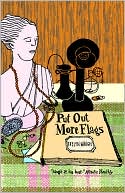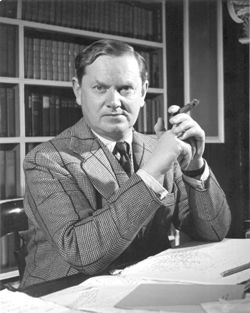I've always vaguely connected Evelyn Waugh and E.M. Forster in my mind - not sure why, other than that 'E', since they didn't really overlap in their writing periods. Having quite liked A Passage to India (which would have been better as a short story, I think) and A R oom With A View, but failed to be overwhelmed by them, I'd also placed Mr. Waugh on the backburner. Which, I discovered as I read Put Out More Flags on the train journey down to Somerset, was a mistake. The writers have more or less nothing in common, and whilst I could read Forster for months without any danger of laughter lines, Waugh is really rather funny.
oom With A View, but failed to be overwhelmed by them, I'd also placed Mr. Waugh on the backburner. Which, I discovered as I read Put Out More Flags on the train journey down to Somerset, was a mistake. The writers have more or less nothing in common, and whilst I could read Forster for months without any danger of laughter lines, Waugh is really rather funny.
 oom With A View, but failed to be overwhelmed by them, I'd also placed Mr. Waugh on the backburner. Which, I discovered as I read Put Out More Flags on the train journey down to Somerset, was a mistake. The writers have more or less nothing in common, and whilst I could read Forster for months without any danger of laughter lines, Waugh is really rather funny.
oom With A View, but failed to be overwhelmed by them, I'd also placed Mr. Waugh on the backburner. Which, I discovered as I read Put Out More Flags on the train journey down to Somerset, was a mistake. The writers have more or less nothing in common, and whilst I could read Forster for months without any danger of laughter lines, Waugh is really rather funny.I don't really know how popular Put Out More Flags is - certainly not one of Waugh's more famous novels, and I hadn't heard of it until someone mentioned it a few months ago. I found the title irresistible. It just sums up the earnest patriotism with no outlet for full venting - how shall we solve it? Put out more flags. Reminds me of a car Colin and I saw during the last World Cup, where someone had stuck seven British flags on their car. You could just imagine looking critically at their car festooned with six flags, and thinking "But will people realise that I love Britain?" Mentioning Colin gives me opportunity to shame him - when he found out I was reading Evelyn Waugh, his faux-intellectual response was "Evelyn Waugh? I love all her books."
Put Out More Flags was published in 1942 and is about the phoney war which preceded the war proper. The central character is Basil Seal - and, through him, his mother, mistress and sister. We see the interior, informal and jokily malevolent workings of the war offices (who continually send all the volunteers and insane visitors to other departments), the recruitment and training of soldiers, responses of the rich and elderly, the bohemian socialists, the unfit, unlikely soldiers. Basically the upper-middle and upper-classes dealing with a strange situation. Barbara (Basil's sister) features in my favourite part of the novel, and a central focus, placing evacuees:
Evacuation to Malfrey had followed much the same course as it had in other parts of the country and had not only kept Barbara, as billeting officer, constantly busy, but had transformed her, in four months, from one of the most popular women in the countryside into a figure of fear. When her car was seen approaching people fled through covered lines of retreat, through side doors and stable yards, into the snow, anywhere to avoid her persuasive, 'But  surely you could manage one more. He's a boy this time and a very well-behaved little fellow.'
surely you could manage one more. He's a boy this time and a very well-behaved little fellow.'
 surely you could manage one more. He's a boy this time and a very well-behaved little fellow.'
surely you could manage one more. He's a boy this time and a very well-behaved little fellow.' There are touches of EM Delafield - especially, unsurprisingly, The Provincial Lady in Wartime, which also features the War Office and its internal 'workings' - but where Waugh diverges from Delafield territory is where I had problem with Put Out More Flags. I found Basil Seal one of the most repugnant, malicious and dislikeable characters I've encountered since Heathcliff. Throughout the novel there were punches of nasty, unkind humour which laughed at ruining the treasured home of an elderly couple, sending an innocent man in exile to Ireland for Basil's own ends, betraying friends for the sake of promotion. Whilst we probably aren't supposed to see Basil Seal as a moral guide, it did seem that we were supposed to be fond of him, look on the character as something of an amusing rascal - whilst in fact he is selfish, vicious and cruel. Give me the self-deprecating humour of EM Delafield, or the affectionate, harmless fun-poking in Mapp and Lucia - Waugh's idea of humour is mostly on the mark, and he uses comic language superbly (I laughed out loud several times) but too often the undercurrent was too nasty for me. I need to read a Wodehouse or two as an antidote.

I've never been able to "get into" either author's work.
ReplyDeleteAs to Waugh, however, you've mentioned before how much you enjoy collections of letters, and if you haven't already read it, I would heartily recommend "The Letters of Nancy Mitford & Evelyn Waugh." Their correspondence was just about as biting and entertaining as you would imagine. It was edited by Charlotte Mosley, to whom we're indebted for last year's "Letters Between Six Sisters."
Happy Easter,
Karen
I have only read one Waugh and that was Brideshead Revisited which I thought would be dull and uninspiring. It was a wonderful read and indeed contains glimpses of very funny humour. He also had an evil repugnant character in that too Lady Marchmain, though I wanted to read more about her, she was one of those evil yet fascinating people. I might have to give this a go after I try Vile Bodies.
ReplyDeleteI read The Loved One by Waugh not too long ago. Didn't hate it, but didn't love it. I would have to check out more of Waugh's work. Maybe next time I get to the bookstore..
ReplyDeleteI disagree that Lady Marchmain is evil -- I think she is self-absorbed, but certainly not two-dimensionally unlikeable. But read Brideshead for yourself. It's an absolute gem of prose -- not one of his amusing little reads -- a truly powerful piece, dealing with love both human and divine, and the costs of both. Stunning. And his Sword of Honor trilogy is the same sort of thing.
ReplyDeleteFor humor, my own favorites are Decline and Fall and Vile Bodies. But the serious stuff is better, imho.
Simon, do, do try Scoop! I think you'd love it. Humorous and incisive without being so cruel as Waugh's comedy often is; a structural masterpiece; and the protagonist is definitely endearing. Plus after reading, you'd probably go around saying 'Up to a point, Lord Copper' all the time (which might or might not be a good thing).
ReplyDeleteI also find Black Mischief - the novel in which Basil Seal first appears - a comic masterpiece, but the humour is certainly a bit more cruel than in Scoop. In BM, though, Basil is amoral and crazy, not actively obnoxious as in Put Out More Flags... I rather suspect that in POMF Waugh was testing how far he could take a character like that!
Waugh is fast becoming one of my top three favourite writers - just picked up 'Vile Bodies' the other day, which has shot straight to the top of my 'to read' list! Must read 'Flags' too. I agree that his humour can be quite vicious, although that is one of my favourite things about him. His characterisation of Brenda Last in the magnificent 'Handful of Dust' is a masterpiece, conveying her utter selfishness which leads to tragedy, but dealt with in a chillingly deliberate 'offhand' manner by Waugh.
ReplyDeleteBizarrely, I always get Waugh and Forster mixed up too! Think it is that dreaded 'E' thing. Sadly, the more I read Forster, the less I like him, while the opposite is true of Waugh.
Button
I love EM Forster. Some years ago I read a slew of his books back to back (but not Passage to India--will get to it eventually). I like Evelyn Waugh, too (though they are very different, aren't they). I've only read Scoop, which is also very humorous. I need to read more of both of them.
ReplyDeleteI have read Put Out More Flags at least forty times (since he mid-seventies+ perhaps fifty. And I still laugh: "That'll teach him to shout at me in the street" thought Basil" And "Art, objets d'. Conducive to spiritual repose..."
ReplyDeleteOf course Basil's a rotter - why the surprise? Humour was of course a more robust (I say healthier) thing seventy years ago,